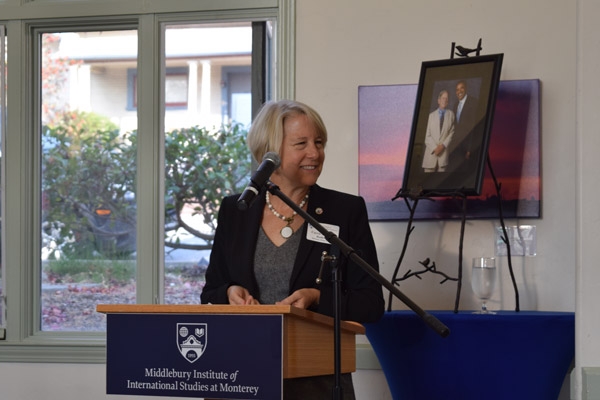Institute Celebrates Deep Ties with Peace Corps

An enthusiastic crowd of more than 60 Middlebury Institute students, alumni, faculty and staff members welcomed Peace Corps Director Carrie Hessler-Radelet at a September 19 breakfast at the Samson Student Center, among them Returned Peace Corps Volunteer and Summer Intensive Language Program alumnus Congressman Sam Farr. Hessler-Radelet traveled to Monterey to present a talk on the subject of “Peace Corps: Past, Present, & Future” for the Institute’s large community of Returned Peace Corps Volunteers (RPCVs), Peace Corps Fellows and Masters International students.
“We’re delighted to have this opportunity to celebrate the deep historic ties between the Institute and the Peace Corps,” added Vice President for Academic Affairs and Dean of the Institute Jeff Dayton-Johnson. “It’s hard to imagine an organization whose mission and values are more closely aligned with the Institute’s.”
The Institute’s ties with the Peace Corps extend all the way back to the program’s late-1950s origins. Although the term “Peace Corps” first achieved widespread public recognition when President John F. Kennedy signed legislation authorizing the program in 1961, the program’s name was actually coined by a Stanford graduate student working for Senator Hubert Humphrey, sponsor of the legislation. The young legislative aide, Peter Grothe, also composed the initial draft of President Kennedy’s first major speech on the Peace Corps, before going on to serve for more than 30 years as the Institute’s director of international student programs.
The Institute’s long partnership with the Peace Corps also includes the Paul D. Coverdell Fellows (a.k.a. Peace Corp Fellows) program, a graduate fellowship that offers financial assistance to RPCVs. Peace Corps Fellows work closely with their career and academic adviser at the Institute to find a degree-related, professional internship in underserved American communities, and receive reduced tuition. The Fellows program also has strong historical ties to the Institute, having been founded by Development Practice and Policy Program Chair Professor Beryl Levinger. “There are lots of opportunities as well as a great deal of freedom and flexibility for students in [the Peace Corps Fellows program],” said Hessler-Radelet.
In addition, for 20 years the Institute partnered with the Peace Corps to offer the Peace Corps Master’s International (PCMI) program, which combines a master’s degree with 27 months of hands-on Peace Corps service. Earlier this year, the Peace Corps announced it will be phasing out the PCMI program. “It was a really hard decision,” said Hessler-Radelet, alluding to efforts to balance competing priorities. The Institute ranked among the top three schools in the nation for PCMI participation for the past several years, and continues to see strong interest both from students also interested in the Peace Corps and from RPCVs.
“This place [the Institute] is special—it has the highest concentration of Peace Corps volunteers apart from the Peace Corps office in Washington, D.C.,” noted RPCV and Professor Jeff Langholz. “Students here have a genuine interest in building a better world.” Added student Adrienne Matunas MATESOL ’16: “All the language preparation at MIIS is a wonderful way to prepare people for the Peace Corps.”
The Peace Corps calls itself “a service opportunity for motivated change makers to immerse themselves in a community abroad, working side by side with local leaders to tackle the most pressing challenges of our generation”—a description very much in line with the aspirations of many Institute students.
For More Information
Jason Warburg
jwarburg@middlebury.edu
831.647.3156
Eva Gudbergsdottir
eva@middlebury.edu
831.647.6606
